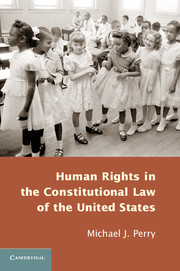Book contents
- Frontmatter
- Dedication
- Contents
- About the Author
- Introduction: Human Rights in the Constitutional Law of the United States
- Part I The Morality of Human Rights
- Part II The Constitutional Morality of the United States
- 4 Capital Punishment
- 5 The Question of Judicial Deference
- 6 The Right to Moral Equality
- 7 The Right to Religious and Moral Freedom
- 8 Same-Sex Marriage
- 9 Abortion
- Concluding Note
- Index
- References
6 - The Right to Moral Equality
Published online by Cambridge University Press: 05 July 2013
- Frontmatter
- Dedication
- Contents
- About the Author
- Introduction: Human Rights in the Constitutional Law of the United States
- Part I The Morality of Human Rights
- Part II The Constitutional Morality of the United States
- 4 Capital Punishment
- 5 The Question of Judicial Deference
- 6 The Right to Moral Equality
- 7 The Right to Religious and Moral Freedom
- 8 Same-Sex Marriage
- 9 Abortion
- Concluding Note
- Index
- References
Summary
Later in this book, I address two of the largest constitutional controversies in the United States today, one concerning same-sex marriage, the other concerning abortion. The two rights that bear most directly on those two controversies are the right to moral equality and the right to religious and moral freedom, each of which fits this profile and is therefore part of the constitutional morality of the United States: internationally recognized as a human right and entrenched in the constitutional law of the United States. In the next chapter, I elaborate the right to religious and moral freedom. In this chapter, I elaborate on the right to moral equality: the right of every human being to be treated by his or her government – indeed, by every government – as morally equal to every other human being; or, put another way, the right not to be treated as morally inferior to any other human being.
The Universal Declaration of Human Rights refers, in the Preamble, to “the inherent dignity…of all members of the human family” (emphasis added) and then states, in Article 1, that “[a]ll human beings…should act towards one another in a spirit of brotherhood.” The right to moral equality follows naturally from – indeed, it is entailed by – the normative ground of human rights: the imperative that every government act toward every human being – toward “all members of the human family” – “in a spirit of brotherhood.”
- Type
- Chapter
- Information
- Human Rights in the Constitutional Law of the United States , pp. 105 - 111Publisher: Cambridge University PressPrint publication year: 2013

